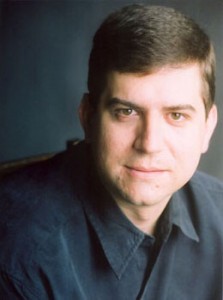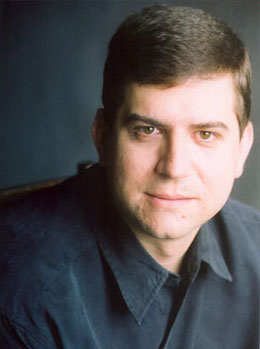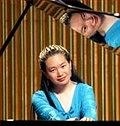The next session was a Round Table Discussion by a panel of four individuals: Pete Jutras, Tianshu Wang, Mary Craig Powell, and Nina Polonsky. The topic was to discuss Amy Chua’s book, “Battle Hymn of the Tiger Mother” and discuss a healthy and effective approach to leading students to achieve their maximum potential.
Here are a few of the comments that struck me the most:
Pete Jutras discussed some of his positive reactions to the book as well as some negative ones.
 Dr. Jutras observed that in Chua’s book, everything is about winning. He posed the question: What is “winning” in music? For the author, it is being #1 in a competition. For Dr. Jutras, he feels it is students who will play their instrument long after they stop taking lessons.
Dr. Jutras observed that in Chua’s book, everything is about winning. He posed the question: What is “winning” in music? For the author, it is being #1 in a competition. For Dr. Jutras, he feels it is students who will play their instrument long after they stop taking lessons.- This leads us to some other questions: Can every student be #1? Does everybody have to play like a concert artists? What does that do to music and music making and piano teaching? Does music have to be this way?
- Among his positive reactions to the book, Dr. Jutras mentioned Chua’s view that parents should not let their kids give up so easily. American parents often ask their kids whether they want to take lessons, despite the fact that kids are often not mature enough to decide that. Also, the Tiger Mom approach has no limits — it does not underestimate what kids can do.
- Another is the idea that enjoyment of an activity occurs when you can do something well. A sense of fun accompanies achievement.
Tianshu Wang was raised Chinese, coincidently, in the same town with the same piano teacher as Lang Lang!
- One of Dr. Wang’s reactions to the book was simply: Why is this so shocking? There are many Tiger mothers out there! 🙂
- There is a Chinese idea that you must go through the bitter first in order to get to the sweet. This is the focus, in contrast to the American idea that everything must be “fun” all the time.
- Chinese parents (Tiger mothers or no) have high expectations for their children. They don’t let their children choose to give up, because they believe the children will regret it when they grow up. Chinese parents was their children to be better them themselves someday.
Mary Craig Powell:
 Mary stated that her reaction to the book overall was that she was horrified! 🙂 However, especially since she is a Suzuki teacher, she did agree very much with the importance of parental involvement. She requires parents of students to attend all lessons, write notes during the lesson, and help the student practice at home. She believes that children find love and security in discipline!
Mary stated that her reaction to the book overall was that she was horrified! 🙂 However, especially since she is a Suzuki teacher, she did agree very much with the importance of parental involvement. She requires parents of students to attend all lessons, write notes during the lesson, and help the student practice at home. She believes that children find love and security in discipline!- Mary went on to describe how she utilizes parental involvement when she teachers her students. For example, she encourages parents to accentuate the positive rather than focusing only on the negative when helping their children practice. She feels that students should always know what they are doing well as well as what could use improvement.
Nina Polonsky:
 Nina shared about her experience coming from a Russian culture to an American one, and her journey in teaching piano to her own twin daughters (who are successful musicians today). She recently asked her daughters how they felt about the way she raised and taught them, and they reacted that while they were grateful for the training and success that they experienced, they also felt they missed out on their childhood somewhat.
Nina shared about her experience coming from a Russian culture to an American one, and her journey in teaching piano to her own twin daughters (who are successful musicians today). She recently asked her daughters how they felt about the way she raised and taught them, and they reacted that while they were grateful for the training and success that they experienced, they also felt they missed out on their childhood somewhat.- Today, Nina feels some regret for some of the ways she handled things (e.g., punishing her daughters to make them practice or comparing them to each other). However, she is glad that the goal was met, that her daughters are successful musicians today.




Great topic. Great post!
I enjoyed this post. Haven’t read the book but have heard lots about it, of course. Thanks for presenting the different reactions.
Interesting topic! I agree that most American parents want their kids to always have fun. Piano and life is not always about fun. How often do we meet adults who regret that they quit taking piano. I hear that more than I hear that my parents forced piano lessons and I hate the piano. My son who is 14 loves the piano. When I asked him if was interested in music as a career he said no but added he couldn’t imagine not playing the piano daily! I need to add that 2 yrs ago my son’s teacher died (unexpected) and I was worried that he might want to quit. When I asked him if he wanted to cont. he reminded me that his teacher always said there was no excuse for not practicing daily…and he went on to say that should would be fussing at him and say just becuase she died was not reason to quit piano.
I really need to check this book out. I have a student who is adopted from China to an American family, but the mom seems to want to raise her like the Chinese do. Which I have absolutely no issue with, I appreciate that she wants to involve the culture of the student’s origins, but at the same time it’s as though she is going overboard with it. The student is extremely gifted and advanced, but she is getting pushed so hard that I worry when she gets older she will resent the instrument rather than enjoy her gift and express her music. I really do not know what to do 🙁